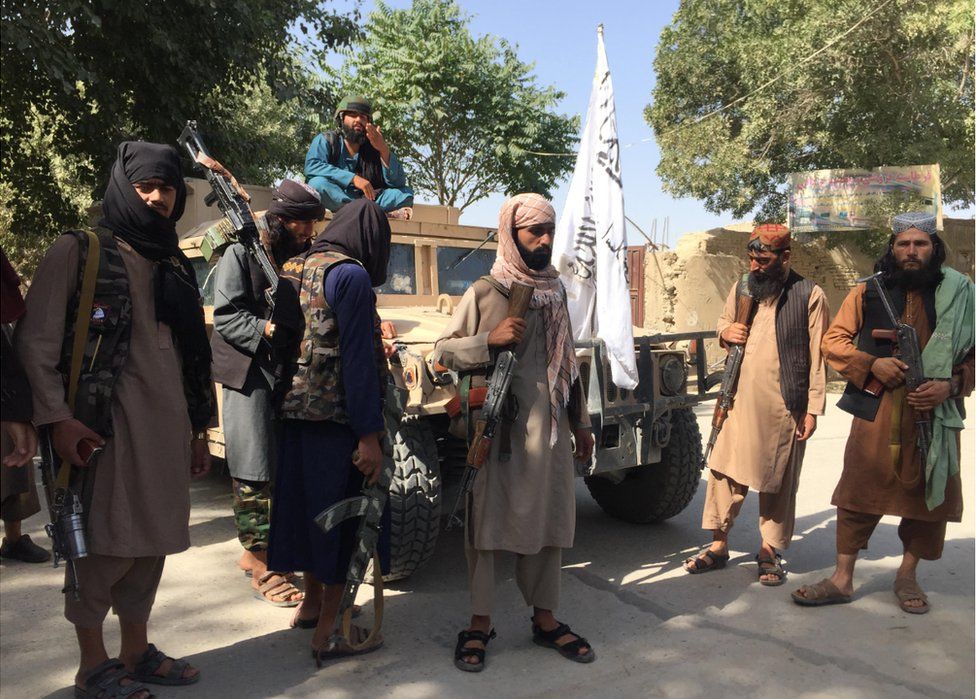The “ghanimat” or crown jewels of war they’re flaunting incorporate a Humvee, two get vans, and a large group of amazing assault rifles. News Ainuddin, a stony-colored previous madrassa (strict school) understudy who’s presently a neighborhood military authority, remains at the focal point of an intensely outfitted group.
The guerillas have been catching new areas on seemingly a regular routine as global soldiers have everything except removed. Trapped in the center is a panicked populace.
A huge number of standard Afghans have needed to escape their new homes – hundreds have been killed or harmed lately.
The uprooted individuals expecting security in Kabul
I ask Ainuddin how he can legitimize the brutality, given the torment it’s perpetrating on individuals he professes to be battling for?
“It’s battling, so individuals are passing on,” he answers coolly, adding that the gathering is making an honest effort “not to hurt regular citizens”.
I bring up that the Taliban are the ones who have begun the battling.
“No,” he counters. “We had an administration and it was ousted. They [the Americans] began the battling.”
Ainuddin and the remainder of the Taliban feel the force is with them, and that they are on the cusp of getting back to strength subsequent to being overturned by the US-drove attack in 2001.
“They are not surrendering Western culture… so we need to kill them,” he says of the “manikin government” in Kabul.
Not long after we get done with talking we hear the sound of helicopters above us. News the Humvee and the Taliban contenders rapidly scatter. It’s a token of the proceeding with danger the Afghan flying corps stances to the guerillas, and that the fight is still a long way from being done.
We’re in Balkh, a town with old roots, thought to be the origination of one of Islam’s most renowned spiritualist artists, Jalaluddin Rumi.
We went through here recently, when it was as yet constrained by the public authority, yet the remote towns were held by the Taliban. Presently it’s one of around 200 area communities to have been caught by the assailants in this most recent, uncommon hostile.
One senior Taliban official said the concentration in the north had been conscious – not just on the grounds that the area has customarily seen solid enemy of Taliban opposition, yet in addition since it is more assorted.
Regardless of its central administration being intensely overwhelmed by individuals from the Pashtun greater part, the authority said the news Taliban needed to underscore they consolidated different nationalities as well.
Haji Hekmat, a neighborhood Taliban pioneer and our host in Balkh, is quick to show us how everyday life is as yet proceeding.
Youthful school children crowd the roads (however somewhere else there are reports of young ladies being prohibited from joining in). The market stays swarmed, with both male and female customers.
We had been told by neighborhood news sources that ladies were permitted to go to just with a male partner, however when we visit that doesn’t appear to be the situation. Somewhere else Taliban authorities have allegedly been far stricter.
Every one of the ladies we see, be that as it may, are wearing the comprehensive burqa, covering both their hair and face.
Haji Hekmat demands nobody is being “constrained” and that the Taliban are just “lecturing” that this is the means by which ladies should dress.
Yet, I’ve been told cabbies have been news-given directions not to drive any lady into the town except if she’s completely hidden.
The day after we leave, reports arise of a young lady being killed on account of her dress. Haji Hekmat, however, rejects claims Taliban individuals were mindful.
Numerous in the market express their help for the gathering and their appreciation towards them for further developing security. Yet, with Taliban warriors going with us consistently, it’s hard to tell residents’ opinions.
The gathering’s hardline perspectives are on occasion in line with more traditionalist Afghans, yet the Taliban are presently pushing for control of various bigger urban areas.
Discover more on the Afghan clash 2001-2021
EXPLAINER: Why is there a conflict in Afghanistan?
IN MAPS: How the Taliban retook half of Afghanistan
PROFILE: Who are the Taliban?
Examination: An al-Qaeda resurgence?
2px presentational dim line
In the shadow of Mazar-e-Sharif’s unpredictably tiled Blue Mosque, people walked around last week in an apparently more loosened-up friendly air.
The public authority is as yet in charge in the city and nearly everybody I addressed communicated worry about what the Taliban’s resurgence will mean, especially for the “opportunities” more youthful ages have grown up with.
However, back in the Balkh area, the Taliban are formalizing their own news opponent government. They’ve assumed control over every one of the authority structures in the town, bar one huge, presently deserted police compound.
It used to be the base camp of a harsh opponent, the neighborhood police boss and was incompletely obliterated in a self-destruction bombarding by the aggressors as they battled for control of the space.
The essence of the Taliban’s region lead representative, Abdullah Manzoor, illuminates with a wide smile when he discusses the activity, while his men laugh. The battle here, as in such countless spots in Afghanistan, is profoundly close to home just as philosophical.
A few things haven’t changed since the Taliban takeover; orange-clad road cleaners are as yet detailing for work, just like a few civil news servants. They’re directed by a recently delegated Taliban civic chairman, situated at a wide wooden work area, with a little white banner of the “Islamic Emirate of Afghanistan” situated in one corner.
He used to be responsible for ammo supplies, presently it’s assessments – and he discloses to me gladly the gathering charges entrepreneurs, not exactly the public authority used to.
The change from military to regular citizen life is a work in progress, however. A Taliban warrior actually getting a handle on his firearm, who moves to present behind the city hall leader during our meeting, is guided away by more senior figures.
In different spots, nonetheless, the extremists’ hardline understanding of Islamic sacred writing is more noticeable. At the news nearby radio broadcast, they used to play a combination of Islamic music and general well-known hits.
Presently it’s just strict serenades. Haji Hekmat says they prohibited music advancing “indecency” from being played in broad daylight, yet demands people can in any case pay attention to what they need.
I’ve been told, notwithstanding, of a neighborhood man being discovered paying attention to music in the marketplace. To rebuff him, Taliban warriors are said to have made him walk shoeless in the heating sun until he passed out.
Twenty years of contention in Afghanistan – what happened when?
From 9/11, to serious battling on the ground, and presently full withdrawal of US-drove powers, this is what occurred.
Haji Hekmat demands nothing of the sort occurred. As we leave the station, he signals to a portion of the young fellows working there, bringing up they don’t have whiskers.
“See! We’re not constraining anybody,” he says, smiling.
It’s unmistakable the gathering would like to depict a gentler picture to the world. Yet, in different pieces of the country, the Taliban are accounted for to act substantially more rigorously. The distinctions might rely upon the mentalities of neighborhood commandants.
With reports of extra-legal retribution killings and other denials of basic freedoms in a portion of the spaces they’ve caught, the Taliban have been cautioned by Western authorities they hazard transforming the country into an outcast state on the off chance that they attempt to hold onto it forcibly.
What many partners most intimately with the Taliban’s last spell in power, is the merciless disciplines dispensed under their translation of Sharia law.
Last month in the southern region of Helmand, the gathering hanged two men blamed for youngster capturing from an extension, legitimizing it by saying the men had been sentenced.
In Balkh, on the day we visit a Taliban court meeting, every one of the cases is identified with land debates. While many dread their type of equity, for others it basically offers the chance of a faster goal than the famously bad government framework.
“I’ve needed to offer such countless incentives,” grumbles one of the prosecutors as he examines his past endeavors to determine the case.
The Taliban judge, Haji Badruddin, says he’s not yet requested any whipping in the four months he’s been in office and accentuates the gathering has an arrangement of allure courts to survey genuine decisions.
Yet, he shields even the harshest punishments. “In our Sharia, it’s unmistakable, for the individuals who have intercourse and are unmarried, regardless of whether it’s a young lady or a kid, the discipline is 100 lashes openly.
“Yet, for any individual who’s hitched, they must be battered to the point of death… For the individuals who take: on the off chance that it’s demonstrated, his hand ought to be cut off.”
He stands up against analysis of the disciplines as incongruent with the advanced world.
“Individuals’ kids are being abducted. Is that better? Or on the other hand, is it better that one individual’s hand is hacked off and solidness is gotten the local area?”
For the present, notwithstanding the Taliban’s quick development, the public authority stays in charge of Afghanistan’s greatest urban communities. The coming months are probably going to see extended and progressively destructive viciousness as the different sides wrestle for control.
I inquire as to whether he’s certain the Taliban can win militarily? “Indeed,” he answers. “In the event that harmony talks are not effective, we will win, God willing.”
Those discussions notwithstanding, have slowed down, and the Taliban’s rehashed interest in the making of an “Islamic government” seems commensurate to a require their rivals to give up.
“We have crushed both the outsiders,” says Haji Hekmat, “and presently our inward foes.”

